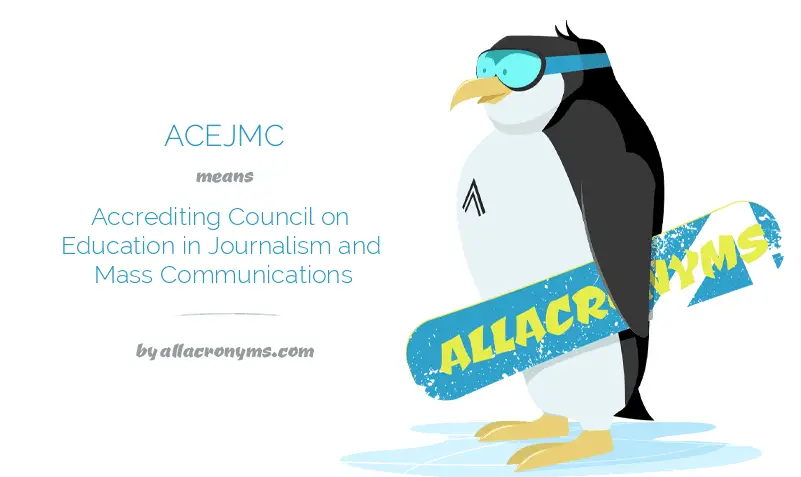Accrediting Council on Education in Journalism and Mass Communications (ACEJMC)
Learn about the Accrediting Council on Education in Journalism and Mass Communications (ACEJMC), the different accrediting standards, ACEJMC accredited educational institutions and more.
Accreditation is a noble act of granting credit and recognizing an educational institution with suitable standards. It thoroughly monitors the functionality of the institution and keeps in check the quality of service. The Accrediting Council on Education in Journalism and Mass Communications (ACEJMC) is one such accreditation agency that checks the quality of professional journalism and mass communications programs in colleges and universities.
What is ACEJMC and what does it do?
The Accrediting Council on Education in Journalism and Mass Communications (ACEJMC) is the agency that cares for the evaluation of professional journalism and mass communications programs in colleges and universities.
What is the need of the hour in accreditation?
With the number of colleges providing professional courses increasing day by day, there is a requirement of an external body that can assess the working of these institutions and provide the standards that these institutions must follow to ensure quality education.
With the surge in colleges involving degree mills, it is very necessary for a monitoring body to be present.
Degree mills mortify the ethics of learning and the significance of educational standards by treating degrees as a commodity to be bought and sold.
Accreditation of specialized academic programs in the United States takes place outside the control of the Federal Government. This division differs from practices in most of the other countries, the focus on voluntary peer review is rare in the world.
The non-governmental nature of accreditation has special importance in journalism and mass communications because of the guarantees of the free press and free speech in the First Amendment.

source - allacronyms.com
Principles and Guiding Values for ACEJMC
ACEJMC is dedicated to excellence and high standards in professional education in journalism and mass communications.
It entwines professional education that recognizes and incorporates technological advancements, thus, changing professional and economic practices, and public interests and demands.
The council appreciates the value of a broad, curriculum incorporating multiple disciplines that nurture critical thinking, analytical reasoning, and problem-solving skills. These aspects are the fundamental foundation for journalism and mass communications education.
It identifies and protects the individual nature of each accredited program.
It promotes educational innovation by programs in their efforts to meet accreditation requirements and standards to prepare students for careers in journalism and mass communication across the globe.
Eligibility Requirements for institutions seeking ACEJMC accreditation
Only those units and establishments which offer proficient and professional journalism, mass media, and communication programs for the students are liable to seek ACEJMC accreditations.
-
The organization must characterize and validate those segments, pertaining to the domain of ACEJMC.
-
Schools seeking accreditation are required to plan and formulate a pre-visit with the ACEJMC official chief within three to five years prior to the first accreditation review.
-
The expenses for accommodation, travel, and the food is to be paid by the schools.
-
The unit or division, for which an invite to accredit would be made must be a perpetual, full-time staff, providing professional courses in journalism and mass communications.
-
Each faculty should be formally designated in the organizational chart.
-
The council normally will not review a unit with less than departmental status.
 source - pexels.com
source - pexels.com
ACEJMC won't assess a unit that does not cling to the Council's open responsibility necessity to give dependable and current maintenance and graduation information on its site, and other understudy accomplishment data.
It won't assess units that aren't licensed by provincially or broadly perceived authorizing office.
The council won't re-establish a foundation's accreditation status or consider starting accreditation status on the off chance that it is subjected to between time activity by any national or provincial authorizing office which will prompt loss of accreditation status.
If an establishment's both expert and non-proficient parts are certified, at that point the board's productions will just include proficient segments that fall under the extent of ACEJMC.
Nine standards used by ACEJMC for accreditations
There are nine standards that the ACEJMC takes into consideration while performing a quality check for the educational institutions. It is important for these institutions to religiously abide by these standards and practice each on a daily basis. Failure in the adherence of any of the stipulated standards can hinder the recognition by the ACEJMC and the educational institute might even be stripped off of the honor of being accredited.
-
Mission, Governance, and Administration
The policies and practices of the unit assure that it has an effective and fairly administered working and learning environment. -
Curriculum and Instruction
The unit provides a curriculum and instruction, whether on-site or online that enables students to acquire the knowledge, competencies, and values established by the Council for training students to work in a diverse global and domestic society. -
Diversity and Inclusiveness
The unit has an inclusive program that values domestic and global diversity and serves and reflects society. -
Full-Time and Part-Time Faculty
The unit recruits and evaluates a well-capable and eligible faculty with a balance of academic and professional credentials appropriate for the unit’s mission. -
Scholarship- Research and Professional Activities fostered by Innovation
With unit support, faculty members contribute to the development and enhancement of scholarly and professional knowledge, engaging in scholarship (research, creative, and professional activity) that advances development and growth. -
Student Services
The unit provides students with the support and services that promote learning and ensure timely completion of their program of study. -
Resources, Facilities, and Equipment
The unit plans to seek and receive adequate resources to fulfill and sustain its mission. -
Professional and Public Service
The unit and its faculty advance journalism and mass communication professions, fulfilling obligations to its community, alumni and the greater public. -
Assessment of Learning Outcomes
The unit regularly assesses student learning and applies results to improve curriculum and instruction.
 source - pexels.com
source - pexels.com
ACEJMC’S strategic directions towards student success
The Council seeks to promote student learning and encourages creativity and experimentation. The Council evaluates curricular and instructions in the light of the evidence and expects programs seeking accreditation to check student’s attainment of professional ethics and competencies.
The Council focuses on the evaluation of student’s learning through three criteria-
-
Awareness - It sees whether the student knows the facts, concepts, laws, theories, and regulations.
-
Understanding - It evaluates the assimilation of the concepts, information, theories, and laws.
-
Application - It checks whether students can apply their theoretical knowledge with the help of analytical, critical, and problem-solving skills.
Student learning is evaluated by the following steps.
-
Develop curriculum, improve teaching, and enhance student learning
-
Document what students have learned; and
-
Provide accountability.
Evaluation of student learning also enables the Council and its representatives to make fairer and more consistent judgments across units and programs.

source - spartanecho.org
ACEJMC Accredited Colleges and Universities
The list of a few institutions which are ACEJMC accredited is given. These listed colleges and universities need to abide by certain principles and norms to be accredited by ACEJMC.
Conclusion
With the rise of accreditation institutes, the standards in professional education can be maintained. Since private bodies are involved in maintaining and approving this accreditation, we can be sure that these voluntary bodies will make sure that standards are maintained by these institutes and quality education is provided.
ACEJMC, since its inception, has been pivotal in maintaining standards for colleges providing journalism and mass communication courses, and its rigorous accreditation process can be trusted by students and the public.
It safeguards the rights of students and emphasizes the quality of education they get.
They are effective in curbing degree mills and ensuring that students get into legit and accredited colleges.
 source - pexels.com
source - pexels.com
Blogs you might be interested in
Frequently Asked Questions
1.What is accreditation?
Accreditation is a system of voluntary self-assessment and external review of educational institutions and of professional programs offered by those institutions. It provides an assurance of quality to students, parents, and the public. In the accrediting process, the performance of educational units is measured against national standards.
2.How many accredited programs exist?
ACEJMC currently accredits 118 professional programs in the United States and outside the country. About 450 colleges and universities offer formal programs in journalism and mass communications, and about 1,000 institutions offer some training in these fields.
3.Which school is the best to pursue journalism?
ACEJMC does not rank programs or compare them with one another. Accreditation by ACEJMC is a measure of the program’s compliance with basic standards and of how well the program achieves its stated mission. The best school for you is the one that offers the most appropriate combination of curriculum, size, location, cost and other factors. Important - The overall quality of the university is as important as the quality of the journalism/mass communications courses they offer.
4.Are accredited schools better than non-accredited schools?
Not necessarily. Accreditation is entirely voluntary and many fine schools do not choose to seek it. However, accredited programs may offer scholarships, internships, competitive prizes, and other activities not available in non-accredited programs.
5.How can I find out which schools offer programs in my field of interest (for example, public relations)?
The list of ACEJMC’s accredited programs shows the degrees awarded by each program, but it is important to remember that degree designation alone may not clarify the program’s course offerings (for example, a unit may offer public relations courses even though it does not award a specific 'B.S.-Public Relations' degree). The best way is to scan through the college website.
6.Which colleges are already standardized by ACEJMC?
Following is the list of colleges accredited by ACEJMC. Arizona State University Ashford University Academy of Art University Abraham Lincoln University Ball State University Calvary University Colorado State University-Fort Collins Eastern Oregon University